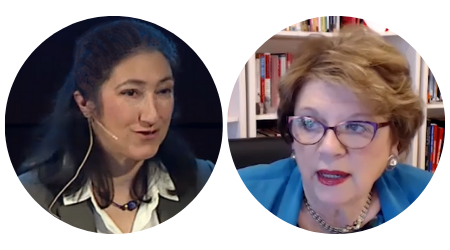Multinational Remote Teams: Challenge or Opportunity?
The FACC-NY network is composed of a diverse mosaic of talented, experienced, and open-hearted professionals united by a desire to share their knowledge, nurture meaningful connections and succeed professionally. In this #MemberInsights series, we invite a guest member to contribute timely and relevant tips and insight for adapting your activities to overcome immediate challenges and plan for the long-term.
In this #MemberInsights feature, hear from Sophie Lechner and Deborah Smith Cook.
Dr. Deborah Smith Cook is the owner and president of Atheseus, a coaching and consulting company that delivers team performance coaching, strategy coaching and consulting, and change management through individuals, teams, and organizations to build superior performance.
Sophie Lechner is Founder & CEO of Global Commerce Education, Inc (GCE). GCE provides business leaders with a roadmap to enter the US market, including strategic guidance on the choice of market entry channel, cultural and communication training, and targeted networking to meet experts, vetted service providers and potential customers.

Now that most employees have been working remotely for several months even the skeptics have discovered that work can actually get done this way. Some employees will return to a traditional office setting, but remote work is likely to remain widespread. So how do we ensure that teams perform at their best and that employees are fulfilled and remain with the company?
Developing high performing teams requires intentionally addressing several aspects of human behavior such as trust, communication, role clarity, structure, collaboration, conflict resolution, motivation and reward systems, feedback, and culture. Building and managing a high performing team is a delicate endeavor in any circumstance. Add to that the remote element and the cultural diversity of many teams and it becomes a complex task.
Today we will focus on trust as one of the foundations of high performance.
Why is trust so important? Trust is the lubricant for getting things done efficiently and quickly. Trust is particularly important in these troubled times as it provides us with predictability and dependability which can reduce the anxiety we feel from uncertainty.
So how do we establish trust on a team? To determine what practical steps we can take, it is helpful to look at the distinction between swift trust and passable trust, identified by Harvard researchers Mortenson & Neely in 1995.
Swift trust develops instantly within a certain set of circumstances and is temporary. For example, when a friend introduces someone to you, swift trust is what causes you to initially assume the person is trustworthy. Similarly, members of a team constituted by management to work on a project will initially trust other team members, even if they don’t know each other because the leader has assigned their trust to each of them.
Passable trust is developed and sustained by observing behavior that matches expectations. Interpersonal trust is gradually developed over time and takes over from swift trust as a more sustainable, longer-term foundation for performance. For remote teams, passable trust is very important because we don’t have the same set of cues available to build trust.
For a team to perform at its best it needs to develop passable trust as quickly as possible. We will talk later about how we can accelerate the development of passable trust.
The team being remote robs us of some of the usual tools to make that transition and the problem is compounded by the fact that both swift and passable trust are actually established differently from one culture to another.
Swift trust exists mostly subconsciously. In the example of a newly formed team, a German person will likely look at their team members’ skills and credentials, whereas a Japanese team member will tend to rely on the fact the team members were chosen by senior leadership, and a Mexican person may try to see if they are already connected via someone in their network. Other cultures rely on other cues about another’s competence by the universities they attended or the organization for which they previously worked. We may not be conscious that we are utilizing these filters to confer this short-term trust; the factors are part of our culture and deeply rooted.
Now let’s look at the transition to passable trust on our global team example. To be seen as trustworthy by their German colleague, a team member will have to deliver on their commitments consistently. The German may themself deliver on commitments but that may not be the way into the Japanese person’s trust. If for example, the German is in the habit of bringing suggestions for their Japanese colleague to meetings, that will make it very difficult for the Japanese to trust the German as they may perceive that as making them lose face and disrupting the harmony of the team. The Mexican will have more trust over time in someone they get to know more personally so that they feel they know their character as a whole.
So what is a manager to do? The first and most important is to acknowledge these trust-building mechanisms and that they differ. Knowing that, a series of strategies can be applied so that everyone can find what they need to both give and be given trust.
In our work with clients, we have witnessed many such strategies used on remote teams. Here are just a few recommendations we chose for you.
Share Stories. We’ve worked with clients who start each meeting by asking team members to briefly share a personal story. It could be about how they’re coping with the pandemic, concern for elderly parents, or dealing with children at home while they’re working. Right now, hearing how members of each culture are dealing with our common enemy, the novel coronavirus, gives us points of connection and empathy.
Find Commonalities. Other clients have created Slack channels for interest groups – #dogowners, #BoardGamePlayers, #ParentsofToddlers, #ChocolateLovers, #mathnerds, #recipesaroundtheglobe, #soccer(football)followers and so on. By finding connections to others, we build trust and that makes it easier for us to reach out for work questions.
Create Shared Experiences. One firm we’ve worked with recently held a virtual two-day mastermind for about 100 people. Before the event, each participant received a package with a collection of envelopes and boxes numbered, with instructions not to open anything until they were instructed to do so. After the Welcome session, participants were instructed to open Box #1 which contained a beautiful pen, a lovely notebook, sticky notes, a highlighter, and a coffee mug – everything the participants needed to “start” the conference and participate actively. Throughout the two days, other envelops and boxes were opened as they related to the content and purpose of the mastermind.
Create Conversations. One firm set up a rotating schedule of 15/20-minute conversations between pairs of individuals to talk about anything but work. This is particularly important if you have team members from a more task-oriented culture such as German or American working with team members from more relationship-based cultures like Mexican or Chinese. Intentionally scheduling opportunities for members of different cultures to get to know each other as humans is a great enabler of high performance in teams. You can use the Slack app, Donut, to automate the process.
Leaders of remote workers need to be deliberate about building trust in teams. Leaders of multinational remote workers face the additional challenge AND opportunity of working with team members from different countries with varying cultural norms and values. Blending the strengths and differences successfully leads to a stronger, higher-performing remote team.
What have you done with your teams that has worked well? Would you say leading or being on a multinational remote team is a challenge or an opportunity? Share your ideas and experiences!
We are planning a webinar on this topic in the coming weeks. If you would like to be invited or if you would like to contribute ideas or questions, please email us!
For more information, please reach out to Deborah and Sophie.

